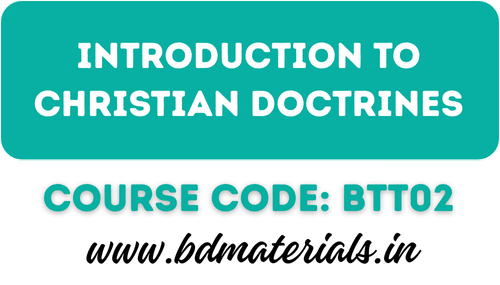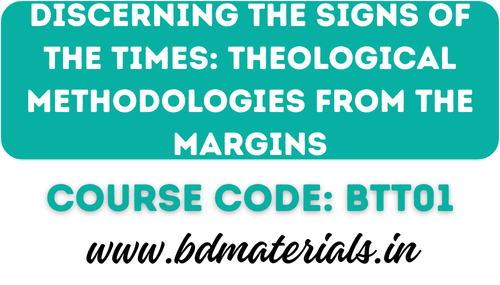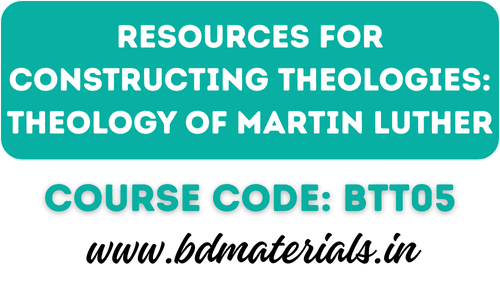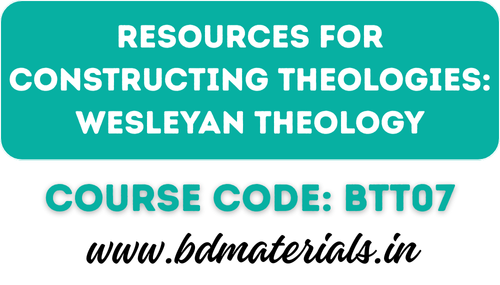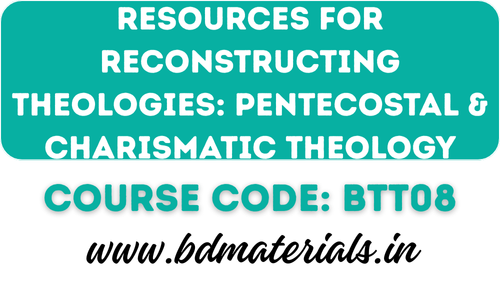Course Code: BTT02
Introduction to Christian Doctrines
BD II, Semester II, 4 Credits Hours, Senate Paper
Objectives
- To acquaint the students with the content of Christian faith in the form of outlines of major doctrines and to equip them to reflect critically on it at the interface of the distinct experiential realities at the margins.
- To enable the students to engage with the doctrines from biblical, historical, and theological perspectives taking into consideration local, confessional, and ecumenical standpoints.
- To expose the students to the socio-political and cultural contexts of the doctrinal formulations to discern the situatedness of the doctrines, in particular social locations of power and domination.
- To help the students visualize that critical, creative, constructive, and imaginative engagements with the doctrines will enable them to transform the life and witness of the Church to make it reflect God’s reign of love, decisively embodied, and manifested in, through, and around Jesus Christ.
Pedagogical Methods
This course will also serve as an introduction to advanced and detailed study of any one of the doctrines or a select cluster of doctrines later in the program. Required readings are meant to prepare the students for active participation in the class. The lectures introduce critically the doctrines and stimulate the students to reflect upon their contextual significance.
Course Requirements
- Final examination 100%
Course Outline
UNIT I: Introduction
- Meaning of Doctrines
- Nature of Doctrines: Theological constructs of Particular Communities in a Particular Time: Doctrines are Contextually formulated and Reformulated: Difference between Doctrines and Dogmas
- Relationship between Faith and Doctrines
- The Relationship Between Apostolic Faith, Historic church and Contemporary-Contextual Realities
- Relationship between Doctrines and Faith-praxis
UNIT II: The Doctrine of Authority
- Revelation
- Faith Communities: Testimonies of the Communities of Faiths
- Traditions and Scripture
- Contextual Reflections on Authority
UNIT III: The Doctrine of the Triune God:
- God the Father/Mother, Jesus Christ and the Holy Spirit
- Godhead as Trinity
- Trinitarian Interpretations: Western, Eastern and Indian
- The concept of Perichoresis and its social implications
- God the Father/Mother
- Features of Christian understanding of God (Attributes, Analogies, Metaphors and Symbols)
- Understanding of God from the Margins (feminist, Dalit, Adivasi, tribal etc:)
- Jesus Christ
- Historical Jesus and the Reign of God
- Select understanding of Jesus Christ in the New Testament
- Select understanding of Jesus Christ in the Early Church
- Select understanding of Jesus Christ in the Contemporary discussions
- The Holy Spirit
- Biblical Understanding of the Holy Spirit
- Classical Approaches to the Holy Spirit
- Discussions on Filioque
- Ecumenical Discussions on Pneumatology
- Reinterpretation of Pneumatology in the context of the Ecological Crisis
- Feminine Images of the Holy Spirit
- Charismatic Understanding of the Holy Spirit
UNIT IV: The Doctrine of Creation
- God the Creator
- Creation-Evolution-Creationism
- Scientific Theories of the Origin of Universe and creatio exnihilo
- Implications of the Doctrine of Creation
- Creation as Essentially Good
- God’s presence in Creation – Theism-Pantheism-Pan-en-theism
- Sacramental Universe
- Justice, Peace and Integrity of Creation
UNIT V: Theological Anthropology
- Humanity as Created: Image of God, Humanity as Co-creators, and co-creatures
- Human as Man and Woman
- Unity of Human Personhood, Dignity, Subjectivity, Freedom
- Non-anthropocentric Theological Anthropology
UNIT VI: Doctrine of Sin and Salvation
- The Nature and Dimension of Sin: Fall, Original Sin and Free Will – Eastern and Western Discussions
- Structural – Systemic – Personal Sin
- The Problem of Evil
- Grace, Faith, Confession, Justification and Sanctification
- Salvation as Liberation, Humanization, theosis
- Salvation as Renewal and Fullness of Life
- Salvation of the Community of Creation
UNIT VII: Doctrine of Ecclesiology
- Biblical Images of the Church
- Major Models of Ecclesiology
- Marks of the Church: One, Holy, Catholic and Apostolic
- Church as Sign and Sacrament of the Reign of God
- Ecclesia Reformata, Semper Reformanda – Church Reformed is always being Reformed
- Church in Relation to other religious/secular communities
UNIT VIII: Worship and Sacrament
- Biblical and Theological Foundation of Worship
- Definition of Sacrament
- Nature and Function of Sacrament
- Eucharist:
- Different understandings of Eucharist
- Theological and Sociological Significance of Eucharist
- Ecological Significance of Eucharist
- Baptism:
- Different Understandings of Baptism
- Baptism-Conversion-Discipleship-Non-baptized Christians
- Ecumenical Affirmation on Ministry and Sacraments: BEM Document
UNIT IX: Doctrine of Ministry and Mission/Witness
- Different Patterns of Christian Ministry
- Ministry of the Laity/Priesthood of All Believers
- Church’s Ministry in Today’s World
- Discerning God’s Mission in the World and the Calling of the Church
- Paradigms of Mission
- Witness as Mission
- Mission as Participation in God’s acts of Liberation and Renewal of Life
- Theosis and Mission
UNIT X: Doctrine of Eschatology
- The Nature, Ground and Content of Christian Hope
- Reflections on Apocalypse, Millennium, Rapture, Second Coming, Judgment
- History and Eschatology
- Realized Eschatology, Proleptic Eschatology
- The Resurrection of the Dead, Eternal Life and fulfillment of the Reign of God
- Eschatology and Redeemed Earth
Concluding Reflections
Bibliography
Basic Books:
- Macquarrie, John. Principles of Christian Theology. New York: Scribner, 1966.
- McGrath, Alister. Christian Theology: An Introduction. Cambridge: Blackwell, 2001.
- Migliore, Daniel L. Faith Seeking Understanding: An Introduction to Christian Theology. Cambridge: Win. B. Wermans, 2004.
- Sobrino, Jon and Ignacio Ellacuria. Systematic Theology: Perspectives from Liberation Theology. Maryknoll: Orbis Books, 1996.
- Thomas, Owen C. Introduction to Theology. Serampore ATL, 1989.
- Moltmann, Juergen . Trinity and the Kingdom of God.
General Books:
- Abba, Raymond. Principles of Christian Worship. New York: Oxford University Press, 1960.
- Aulen, Gustaf. Faith of the Christian Church. Philadelphia: Fortress Press, 1993.
- Boyd, Robin. Khristadvaita: A Theology for India. Madras: CLS, 1977.
- Braaten, Carl E. and Robert W. Jenson, eds. The Last Things: Biblical and Theological Perspectives on Eschatology. Grand Rapids, MI: Wm B. Eerdmans Publishing Co., 2002.
- Chandran, Russell. I Believe. Bangalore: SCM Publications, 1993.
- Cone, James. Black Theology of Liberation.
- Johnson, Elizabeth. She Who Is.
- Forward, Martin. Jesus – A Short Biography. Oxford: Oneworld Publications, 1998.
- Heim, S. Mark. Salvations: Truth and Difference in Religion. Maryknoll: Orbis Books, 2000.
- Hengstenberg, E.W. Christology of the Old Testament. Secunderabad: OM Books, 2003.
- Jones, Gareth. Christian Theology: A Brief Introduction. Cambridge: Polity Press, 1999.
- Gonsalves, Francis. God of Our Soil. New Delhi: ISPCK, 2010.
- Jones, Serene and Paul Lakeland, eds. Constructive Theology: A Contemporary Approach to Classical Themes. Minneapolis: Fortress Press, 2006.
- Kwok, Pui-Lan. Asian Feminist Theology.
- Lorenzen, Thorwald. Resurrection and Discipleship. Maryknoll: Orbis Books, 1995.
- McGrath, Alister. Historical Theology: An Introduction to the History of Christian Thought. Oxford: Blackwell, 1998.
- Moltmann, Jurgen. Theology of Hope: On the Ground and Implications of a Christian Eschatology. Minneapolis: Fortress Press, 1993.
- Osthathios, Geevarghese Mar. Sharing God, Sharing World. Delhi: ISPCK, 1995.
- Pannenberg, Wolfgang. Systematic Theology. 3 Volumes. Michigan: W.B. Eerdmans, 1994.
- Panikkar, Raymundo. The Trinity and the World Religions. Madras: CLS, 1970.
- Parrat, John, ed. An Introduction to Third World Theologies. Cambridge: Cambridge University Press, 2004.
- Sobrino, Jon and Ignacio Ellacuria. Systematic Theology: Perspectives from Liberation Theology. Maryknoll: Orbis Books, 1996.
- Solle, Dorothee. Thinking about God: An Introduction to Theology. London: SCM Press, 1990.
- Thomas, Amit. Christ in Multidimensional Context. New Delhi: Christian World Imprints, 2015.
- Thomas, M.M. Salvation and Humanization. Madras: CLS, 1971.
- Vanlalthlana. An Augustine’s Doctrine of Grace and Human Free Will: An Approach from Mizo Christian Perspective. Delhi: ISPCK, 2010.
- Vanlalauva, H. Doctrine of God: A Study of Calvin’s Doctrine of God in Relation to the Indian Context. Delhi: ISPCK, 2007.
- Wright, N.T. Surprised by Hope: Rethinking Heaven, The Resurrection and the Mission of the Church. NY: HarperCollins, 2008.
Friendly Note
Bachelor of Divinity Materials is your one-stop resource for comprehensive Biblical studies, designed to support students pursuing a Bachelor of Divinity (B.D.) and other theological courses. Our website is a dedicated platform that provides access to the full syllabus of the Bachelor of Divinity course along with detailed answers, ensuring a thorough understanding of every subject and topic covered in your curriculum.
Here, you will find a vast collection of assignments, study guides, articles, and research papers meticulously curated to assist you in excelling academically. The platform also features a rich selection of theological books, journals, and resources spanning diverse subjects such as Old Testament, New Testament, Systematic Theology, Church History, Biblical Languages, and Pastoral Studies.
To make your learning experience convenient and accessible, we offer downloadable PDFs of study materials, including books and journals, allowing you to learn anytime, anywhere. Whether you are preparing for exams, writing assignments, or conducting in-depth research, these resources are tailored to meet the needs of both students and scholars in biblical and theological studies.
With a commitment to empowering theological learners, our mission is to provide high-quality, authentic, and practical study materials. Explore Bachelor of Divinity Materials to grow spiritually, academically, and intellectually as you deepen your understanding of God’s Word and Christian doctrine. This platform is a valuable resource for aspiring ministers, pastors, and anyone dedicated to the study of theology and biblical teachings.
